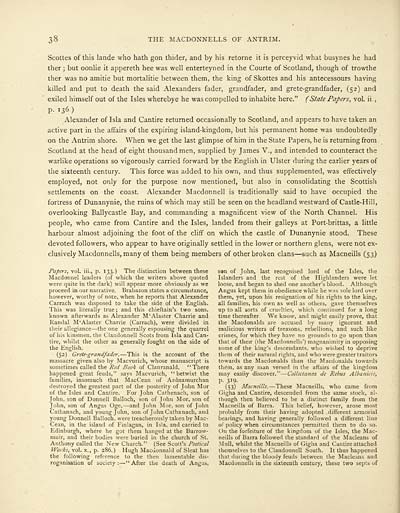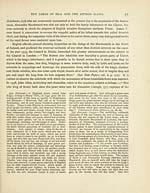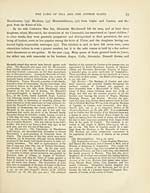Historical account of the Macdonnells of Antrim
(52) Page 38
Download files
Complete book:
Individual page:
Thumbnail gallery: Grid view | List view

38 THE MACDONNELLS OF ANTRIM.
Scottes of this lande who hath gon thider, and by his retorne it is perceyvid what busynes he had
ther ; but oonlie it appereth hee was well enterteyned in the Courte of Scotland, though of trowthe
ther was no amitie but mortalitie between them, the king of Skottes and his antecessours having
killed and put to death the said Alexanders fader, grandfader, and grete-grandfader, (52) and
exiled himself out of the Isles wherebye he was compelled to inhabite here." ( State Papers, vol. ii.,
p. 136.)
Alexander of Isla and Cantire returned occasionally to Scotland, and appears to have taken an
active part in the affairs of the expiring island-kingdom, but his permanent home was undoubtedly
on the Antrim shore. When we get the last glimpse of him in the State Papers, he is returning from
Scotland at the head of eight thousand men, supplied by James V., and intended to counteract the
warlike operations so vigorously carried forward by the English in Ulster during the earlier years of
the sixteenth century. This force was added to his own, and thus supplemented, was effectively
employed, not only for the purpose now mentioned, but also in consolidating the Scottish
settlements on the coast. Alexander Macdonnell is traditionally said to have occupied the
fortress of Dunanynie, the ruins of which may still be seen on the headland westward of Castle-Hill,
overlooking Ballycastle Bay, and commanding a magnificent view of the North Channel. His
people, who came from Cantire and the Isles, landed from their galleys at Port-brittas, a little
harbour almost adjoining the foot of the cliff on which the castle of Dunanynie stood. These
devoted followers, who appear to have originally settled in the lower or northern glens, were not ex-
clusively Macdonnells, many of them being members of other broken clans — such as Macneills (53)
Papers, vol. iii., p. 133.) The distinction between these son of John, last recognised lord of the Isles, the
Macdonnel leaders (of which the writers above quoted Islanders and the rest of the Highlanders were let
were quite in the dark) will appear more obviously as we loose, and began to shed one another's blood. Although
proceed in our narrative. Brabazon states a circumstance, Angus kept them in obedience while he was sole lord over
however, worthy of note, when he reports that Alexander them, yet, upon his resignation of his rights to the king,
Carrach was disposed to take the side of the English. all families, his own as well as others, gave themselves
This was literally true; and this chieftain's two sons, up to all sorts of cruelties, which continued for along
known afterwards as Alexander M'Alaster Charrie and time thereafter. We know, and might easily prove, that
Randal M'Alaster Charrie (Carrach), were divided in the Macdonalds are accused by many ignorant and
their allegiance — the one generally espousing the quarrel malicious writers of treasons, rebellions, and such like
of his kinsmen, the Clandonnell Scots from Isla and Can- crimes, for which they have no grounds to go upon than
tire, whilst the other as generally fought on the side of that of their (the Macdonnells') magnanimity in opposing
the English. some of the king's descendants, who wished to deprive
(52) Grete-grandfader. — This is the account of the them of their natural rights, and who were greater traitors
massacre given also by Macvurich, whose manuscript is towards the Macdonalds than the Macdonalds towards
sometimes called the Red Book of Clanranald. "There them, as any man versed in the affairs of the kingdom
happened great feuds," says Macvurich, "betwixt the may easiiy discover." — Collectanea de Rebus Albanicis,
families, insomuch that MacCean of Ardnamurchan p. 319.
destroyed the greatest part of the posterity of John Mor (53) Macneills. — These Macneills, who came from
of the Isles and Cantire. For John Cathenach, son of Gigha and Cantire, descended from the same stock, al-
John, son of Donnell Balloch, son of John Mor, son of though then believed to be a distinct family from the
John, son of Angus Oge, — and John Mor, son of John Macneills of Barra. This belief, however, arose most
Cathanach, and young John, son of JohnCathanach, and probably from their having adopted different armorial
young Donnell Balloch, were treacherously taken by Mac- bearings, and having generally followed a different line
Cean, in the island of Finlagan, in Isla, and carried to of policy when circumstances permitted them to do so.
Edinburgh, where he got them hanged at the Burrow- On the forfeiture of the kingdom of the Isles, the Mac-
muir, and their bodies were buried in the church of St. neills of Barra followed the standard of the Macleans of
Anthony called the New Church." (See Scott's Poetical Mull, whilst the Macneills of Gigha and Cantire attached
Works, vol. x., p. 286.) Hugh Macdonnald of Sleat has themselves to the Clandonnell South. It thus happened
the following reference to the then lamentable dis- that during the bloody feuds between the Macleans and
roganisation of society :— " After the death of Angus, Macdonnells in the sixteenth century, these two septs of
Scottes of this lande who hath gon thider, and by his retorne it is perceyvid what busynes he had
ther ; but oonlie it appereth hee was well enterteyned in the Courte of Scotland, though of trowthe
ther was no amitie but mortalitie between them, the king of Skottes and his antecessours having
killed and put to death the said Alexanders fader, grandfader, and grete-grandfader, (52) and
exiled himself out of the Isles wherebye he was compelled to inhabite here." ( State Papers, vol. ii.,
p. 136.)
Alexander of Isla and Cantire returned occasionally to Scotland, and appears to have taken an
active part in the affairs of the expiring island-kingdom, but his permanent home was undoubtedly
on the Antrim shore. When we get the last glimpse of him in the State Papers, he is returning from
Scotland at the head of eight thousand men, supplied by James V., and intended to counteract the
warlike operations so vigorously carried forward by the English in Ulster during the earlier years of
the sixteenth century. This force was added to his own, and thus supplemented, was effectively
employed, not only for the purpose now mentioned, but also in consolidating the Scottish
settlements on the coast. Alexander Macdonnell is traditionally said to have occupied the
fortress of Dunanynie, the ruins of which may still be seen on the headland westward of Castle-Hill,
overlooking Ballycastle Bay, and commanding a magnificent view of the North Channel. His
people, who came from Cantire and the Isles, landed from their galleys at Port-brittas, a little
harbour almost adjoining the foot of the cliff on which the castle of Dunanynie stood. These
devoted followers, who appear to have originally settled in the lower or northern glens, were not ex-
clusively Macdonnells, many of them being members of other broken clans — such as Macneills (53)
Papers, vol. iii., p. 133.) The distinction between these son of John, last recognised lord of the Isles, the
Macdonnel leaders (of which the writers above quoted Islanders and the rest of the Highlanders were let
were quite in the dark) will appear more obviously as we loose, and began to shed one another's blood. Although
proceed in our narrative. Brabazon states a circumstance, Angus kept them in obedience while he was sole lord over
however, worthy of note, when he reports that Alexander them, yet, upon his resignation of his rights to the king,
Carrach was disposed to take the side of the English. all families, his own as well as others, gave themselves
This was literally true; and this chieftain's two sons, up to all sorts of cruelties, which continued for along
known afterwards as Alexander M'Alaster Charrie and time thereafter. We know, and might easily prove, that
Randal M'Alaster Charrie (Carrach), were divided in the Macdonalds are accused by many ignorant and
their allegiance — the one generally espousing the quarrel malicious writers of treasons, rebellions, and such like
of his kinsmen, the Clandonnell Scots from Isla and Can- crimes, for which they have no grounds to go upon than
tire, whilst the other as generally fought on the side of that of their (the Macdonnells') magnanimity in opposing
the English. some of the king's descendants, who wished to deprive
(52) Grete-grandfader. — This is the account of the them of their natural rights, and who were greater traitors
massacre given also by Macvurich, whose manuscript is towards the Macdonalds than the Macdonalds towards
sometimes called the Red Book of Clanranald. "There them, as any man versed in the affairs of the kingdom
happened great feuds," says Macvurich, "betwixt the may easiiy discover." — Collectanea de Rebus Albanicis,
families, insomuch that MacCean of Ardnamurchan p. 319.
destroyed the greatest part of the posterity of John Mor (53) Macneills. — These Macneills, who came from
of the Isles and Cantire. For John Cathenach, son of Gigha and Cantire, descended from the same stock, al-
John, son of Donnell Balloch, son of John Mor, son of though then believed to be a distinct family from the
John, son of Angus Oge, — and John Mor, son of John Macneills of Barra. This belief, however, arose most
Cathanach, and young John, son of JohnCathanach, and probably from their having adopted different armorial
young Donnell Balloch, were treacherously taken by Mac- bearings, and having generally followed a different line
Cean, in the island of Finlagan, in Isla, and carried to of policy when circumstances permitted them to do so.
Edinburgh, where he got them hanged at the Burrow- On the forfeiture of the kingdom of the Isles, the Mac-
muir, and their bodies were buried in the church of St. neills of Barra followed the standard of the Macleans of
Anthony called the New Church." (See Scott's Poetical Mull, whilst the Macneills of Gigha and Cantire attached
Works, vol. x., p. 286.) Hugh Macdonnald of Sleat has themselves to the Clandonnell South. It thus happened
the following reference to the then lamentable dis- that during the bloody feuds between the Macleans and
roganisation of society :— " After the death of Angus, Macdonnells in the sixteenth century, these two septs of
Set display mode to:
![]() Universal Viewer |
Universal Viewer | ![]() Mirador |
Large image | Transcription
Mirador |
Large image | Transcription
Images and transcriptions on this page, including medium image downloads, may be used under the Creative Commons Attribution 4.0 International Licence unless otherwise stated. ![]()
| Histories of Scottish families > Historical account of the Macdonnells of Antrim > (52) Page 38 |
|---|
| Permanent URL | https://digital.nls.uk/95341871 |
|---|
| Description | A selection of almost 400 printed items relating to the history of Scottish families, mostly dating from the 19th and early 20th centuries. Includes memoirs, genealogies and clan histories, with a few produced by emigrant families. The earliest family history goes back to AD 916. |
|---|

